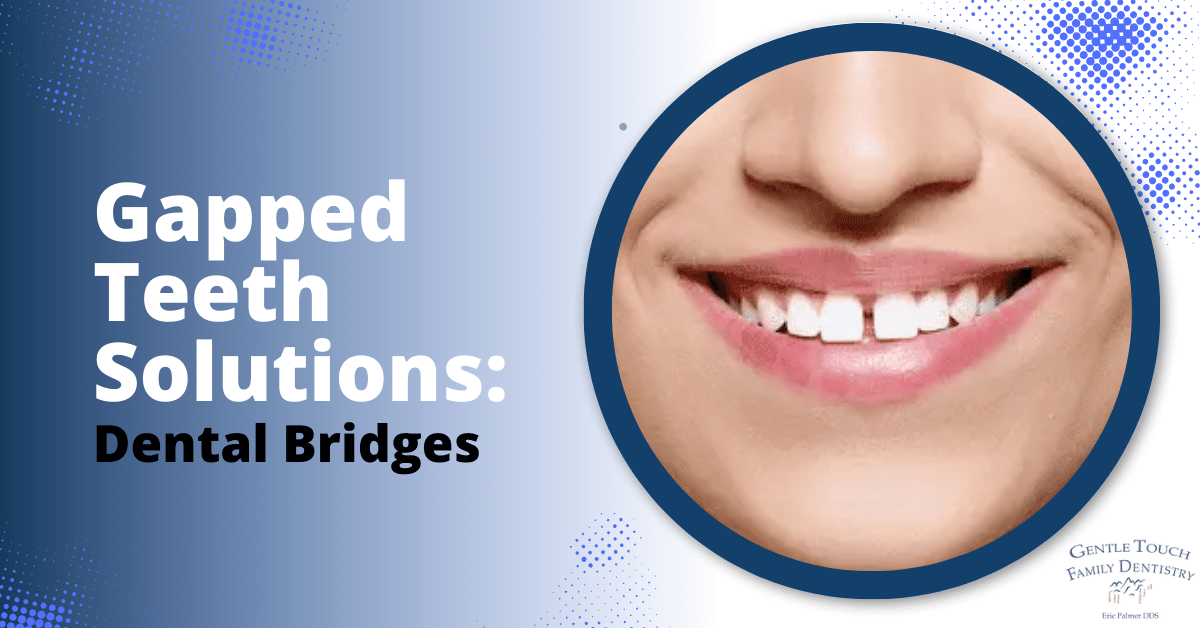
Are you one of those individuals who have experienced the discomfort of having gaps between your teeth? Diastema, or gaps between the teeth, can impact your oral health and make you feel self-conscious. Thankfully, there are a number of options for dealing with this problem; one common approach is dental bridges.
How Do Dental Bridges Serve As Solutions For Closing Gaps Between Teeth?
Dental bridges are a tried-and-true method for helping to close the spaces that exist between teeth. They are prosthetic devices that effectively bridge the gap that is caused by one or more missing teeth by filling the space that is created by the missing teeth.
The fake teeth, also known as pontics, and the abutment teeth, which are located on either side of the bridge and serve as anchors, are the two primary components that make up these tooth bridges.
The procedure involves preparing the abutment teeth by reshaping them slightly to accommodate crowns, which will serve as attachment points for the bridge. Once the abutment teeth are prepared, the pontic is securely attached to them, creating a seamless appearance.
What Are The Common Causes Of Gapped Teeth, And How Are Dental Bridges Used To Address This Issue?
Gapped teeth can result from various causes, including genetics, gum disease, thumb-sucking habits in childhood, or missing teeth due to injury or extraction. Regardless of the cause, dental bridges offer an effective solution. By filling the gaps, they not only improve the appearance of your smile but also restore functionality.
For instance, if you have lost a tooth due to an accident, a dental bridge can help you regain the ability to chew and speak normally. Moreover, it can prevent adjacent teeth from shifting out of place, a common consequence of missing teeth.
Are There Different Types Of Dental Bridges Available For Individuals Seeking Gapped Teeth Solutions?
Yes, several types of dental bridges are available to cater to different patient needs. Traditional, cantilever, Maryland, and implant-supported bridges are the most prevalent forms.
- Traditional Bridges: These bridges consist of pontics placed by crowns on adjacent teeth. They are a reliable and cost-effective solution for closing small to medium-sized gaps.
- Cantilever Bridges: Unlike traditional bridges, cantilever bridges are anchored to only one adjacent tooth. They are typically used when only one adjoining tooth is available to support the bridge.
- Maryland Bridges: Maryland bridges utilize a framework composed of either metal or porcelain that is bonded to the back of neighboring teeth, thereby eliminating the necessity for crowns. They are a conservative option that preserves the integrity of the adjacent teeth.
- Implant-Supported Bridges: These bridges are anchored to dental implants surgically placed in the jawbone. They offer the most stability and suitcases with multiple missing teeth.
The choice of bridge type will depend on factors such as the location of the gap, the condition of adjacent teeth, and your budget.
Can Dental Bridges Be A Suitable Alternative To Orthodontic Treatments For Closing Gaps Between Teeth?
While dental bridges are an effective solution for closing gaps between teeth, they may not always be a suitable alternative to orthodontic treatments. Orthodontic treatments like braces or clear aligners are better suited for cases where the gaps are caused by misalignment of the teeth or overcrowding. These treatments address the underlying issue, gradually shifting teeth into their correct positions.
On the other hand, dental bridges are ideal for cases where the gaps result from missing teeth or are too significant to be corrected by orthodontic means alone. The dentist will evaluate your individual circumstances and suggest the most suitable course of treatment.
What Is The Process Of Getting Dental Bridges For Gapped Teeth, And What Are The Expected Results In Terms Of Appearance And Functionality?
The procedure for obtaining dental bridges usually consists of multiple stages. Following an initial consultation and assessment, the dentist will proceed to prepare the abutment teeth by delicately removing a small portion of the enamel. We will take impressions of your teeth in order to create a custom bridge that perfectly matches the color and shape of your natural teeth.
During the interim period before the permanent bridge is installed, it is possible to place a temporary bridge in order to safeguard the abutment teeth. After the permanent bridge is completed, it will be carefully fitted and adjusted to ensure a comfortable and seamless fit. By ensuring proper care and regular dental check-ups, dental bridges can offer long-lasting benefits both in terms of appearance and functionality.
Dental bridges are crafted to seamlessly blend with your natural teeth, resulting in a lifelike appearance. These dental procedures have the potential to greatly improve the appearance of your teeth and increase your self-assurance.
Functionally, dental bridges restore your ability to bite and chew comfortably. They also help evenly distribute your bite’s force evenly, preventing strain on surrounding teeth. Moreover, they maintain your teeth’ alignment and preserve your oral health.
Dental bridges offer a reliable solution for closing gaps between teeth caused by various factors. Dental bridges are an effective solution for restoring both the appearance and function of your smile, whether you have one missing tooth or multiple gaps.
If you are contemplating this option, it is advisable to seek guidance from your dentist in order to identify the most suitable type of bridge for your individual requirements. By doing so, you will be able to experience the advantages of having a fully restored and self-assured smile.
Why We’re Your Best Choice for Dental Bridges
When restoring your smile and closing those bothersome gaps between your teeth, you want a trustworthy dental provider. Here at Gentle Touch Family Dentistry, we offer top-notch dental bridge solutions to meet your unique needs. Here’s why we believe we’re your best choice:
- Expertise and Experience
Our team comprises dentists with extensive expertise in restorative dentistry, particularly dental bridges. Our team’s extensive experience ensures that your smile is in capable hands.
- Personalized Care
Every patient is unique, and your dental needs are no exception. We take the time to assess your situation and recommend the most suitable type of dental bridge tailored to your requirements.
- State-of-the-Art Technology
We invest in the latest dental technology to ensure our procedures are efficient, comfortable, and minimally invasive. Our advanced equipment allows us to create precise impressions and deliver the best possible results.
- Affordable Pricing
Our dental bridge services are competitively priced, with a typical range of $1,000 to $3,000 per tooth, depending on the type of bridge needed. We offer flexible payment options and work with various insurance providers to help you fit the cost into your budget.
Frequently Asked Questions
- How much does a dental bridge cost?
A dental bridge’s price tag could change based on where you live, the materials utilized, and the specific style of bridge you need. The price per tooth might range from $1,000 to $3,000. To get a precise quote that fits your demands perfectly, it’s important to talk to our staff.
- Will my insurance cover the cost of a dental bridge?
Dental bridges can be partially covered by many insurance policies, especially when the operation is considered medically necessary. Our staff will diligently work with your insurance company to reduce your deductible and keep your out-of-pocket costs to a minimum.
- How long does the dental bridge procedure take?
The process of getting a dental bridge typically involves a few appointments spread over a few weeks. Tooth preparation, impressions, and the fitting of the permanent bridge follow the initial consultation and assessment. Each appointment may take a couple of hours, and the entire process may take several weeks.
- Are dental bridges a permanent solution?
Although dental bridges, when cared for correctly, can endure for years, they are still not thought of as a long-term fix. It may be necessary to replace the bridge due to wear and tear or damage that occurs over time. If you want your bridge to last as long as possible, it’s crucial that you maintain excellent oral hygiene and see your dentist often.
- Is the procedure painful?
Dental bridge procedures are generally not painful. Local anesthesia is used to numb the area during tooth preparation, ensuring minimal discomfort. After the procedure, there might be a slight soreness or sensitivity, but it can usually be managed with over-the-counter pain relief medication.
Call Us for Expert Teeth Solutions!
The spaces in your teeth aren’t going to stop you from achieving your goals. Our professional dental bridge solutions are here to help you attain a beautiful, self-assured smile at Gentle Touch Family Dentistry. From the first consultation through the last fitting, our helpful staff is here to guide you every step of the way.
Contact us today to schedule your appointment and take the first step towards closing those gaps, restoring your smile’s functionality, and boosting your self-confidence. Your dream smile is within reach, and we’re here to make it a reality!



